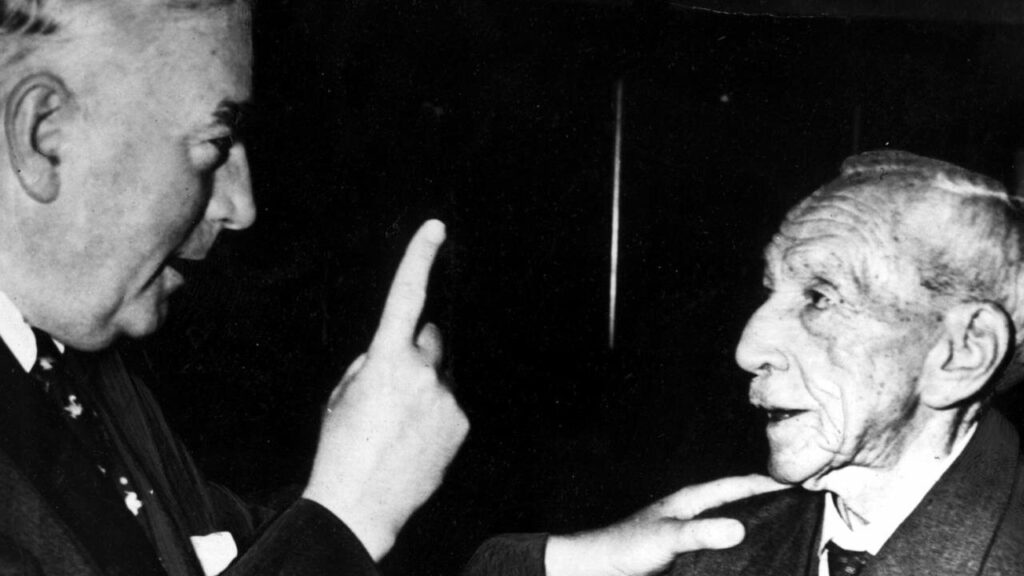On this day, 23 September 1943, Menzies is announced in the House of Representatives as the new Leader of the Opposition. He had been elected the previous day by a UAP party-room that had just been devastated by a sweeping election loss, replacing the 80-year-old Billy Hughes. Menzies was tasked with resurrecting the non-Labor forces from their lowest ebb, while having to overcome the fact that many thought of him as already a proven failure for the way in which his first Government had imploded.
Menzies had never been Opposition Leader before becoming Prime Minister, and since his resignation in August 1941 Coalition stocks had been so low that Arthur Fadden, the Leader of the junior Coalition partner the Country Party, had led the non-Labor formation in the House. When Menzies had resigned, he had initially stayed on as Leader of the UAP, but after the short-lived Fadden Government was defeated by a division of 36-33, Menzies argued that the UAP should go into Opposition by separating completely from the Country Party. Menzies rescinded the leadership of the UAP to allow a free vote on the issue and it was only after the party decided to continue with the Coalition arrangement that he decided not to recontest his position.
The next two years would be a time of intense reflection. Menzies tried several times to get a diplomatic posting but was repeatedly rebuffed. He was thus forced to return to the Bar to supplement his income. Menzies would walk the four miles from his home in Kew to his office in the Melbourne CBD, a ritual that provided a great opportunity for soul-searching and productive thought.
This thought would bear fruit in the Forgotten People broadcasts, transmitted over commercial radio beginning in 1942. Modelled on Franklin Roosevelt’s fireside chats, these gave Menzies the opportunity to get into the homes of listeners and elaborate a broader political philosophy than would ever be possible on the campaign hustings. Menzies revelled in the freedom that his position of non-leadership allowed, waxing lyrical about the topics of the day as well as political principles. This active engagement with ideas and even abstract policy formation meant that Menzies was in a unique position of preparedness to revitalise his side of politics.
In the post-election party meeting the central issue was once again the UAP’s relationship with the Country Party, and this allowed Menzies to position himself as the champion of an independent UAP and win a narrow contest on the force of that conviction. However, he continued to have some doubts about the magnitude of the task that lay in front of him. Dame Pattie later admitted that shortly after her husband regained the leadership, he allowed his name to be put forward for the position of Chief Justice of Victoria, a job he would have seized with relish. Menzies did not get it, and so turned his attention to constructing what would become the Liberal Party.
Menzies was still delivering weekly radio broadcasts when he became Opposition Leader, and on 24 September he would deliver an address entitled ‘Leading the Opposition’ which shows how he was trying to put a positive spin on the likelihood of what he was already dubbing ‘a liberal revival’:
‘In the last few days my mind has run back very much to the recollection of what happened in 1930 and 1931. At the end of 1929 Mr. Scullin had secured a record majority in the House of Representative. Gloomy prophets said that Labour was in for ten years; that all was over. Yet, Mr. Latham, as he then was, becoming Leader of not more than thirteen Party Members who included such doughty Parliamentary fighters as the late Henry Gullet, Archdale Parkhill, and the late Charles Hawker, to say nothing of others who are still in the Party, so organised and conducted an Opposition that it became first a debating force and then a National force. The Government disintegrated and in 1931 was swept away at a general election. For the efficacy of the Opposition, numbers are of small importance. “It’s dogged that does it”. I have been long enough in Parliament never to under-estimate a political opponent or a political problem. But I want all of you to know that on this job, the Opposition’s tail is up!…
Surely hundreds of thousands of people must have a rich faith in a political doctrine which elevates the importance of the individual, which seeks to expand his power, which never forgets his social duties and which indeed increases them year by year, but which knows that the man’s the thing and not the administrative machine we call the State.
My colleagues and I, and we may hope our thoughtful friends, will hammer these things out in our minds. For a political revival campaign is overdue if liberalism is not to die; and a revival campaign requires not only talented preachers but a soul-rousing gospel.’
Further Reading:
‘Weekly Broadcasts’, from the Menzies Papers in the National Library of Australia.
Anne Henderson, Menzies at War (NewSouth Publishing, 2014).
A.W. Martin, Robert Menzies, A Life: Volume 1 1894-1943 (Melbourne University Press, 1993).
Sign up to our newsletter
Sign up for our monthly newsletter to hear the latest news and receive information about upcoming events.


